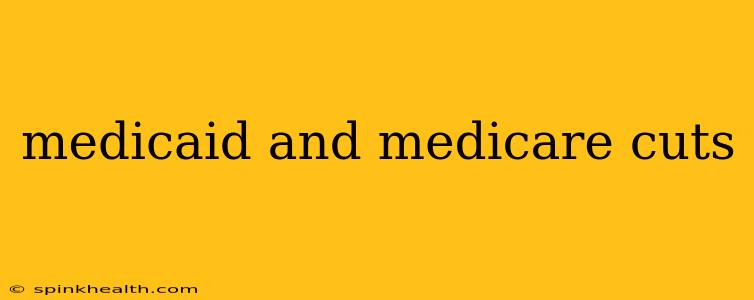Navigating the Maze: Understanding Potential Medicaid and Medicare Cuts
The possibility of Medicaid and Medicare cuts often sparks anxieties and confusion. These programs are lifelines for millions of Americans, providing crucial healthcare access. Let's unravel the complexities surrounding potential reductions in funding and their potential impacts. This isn't just about numbers; it's about the real-life consequences for individuals and families relying on these vital safety nets.
My journey into understanding this topic began with a simple question: What are the potential consequences of Medicaid and Medicare cuts? The answer, as I soon discovered, is multifaceted and deeply intertwined with political, economic, and social factors.
What are the potential consequences of Medicaid and Medicare cuts?
The consequences of cuts to Medicaid and Medicare are far-reaching and potentially devastating. Reduced funding could lead to:
-
Increased Uninsured Rates: Cuts to Medicaid could leave millions without health insurance, forcing them to forgo necessary care or face crushing medical debt. This disproportionately affects low-income individuals and families, exacerbating existing health disparities.
-
Reduced Access to Care: Fewer providers might accept Medicaid patients due to lower reimbursements, leading to longer wait times, limited choices of doctors, and difficulty accessing specialized care. This translates to delayed diagnoses and treatments, potentially worsening health outcomes.
-
Higher Out-of-Pocket Costs: Even for those remaining enrolled, higher deductibles, co-pays, and premiums could make accessing healthcare unaffordable, effectively negating the benefits of insurance coverage.
-
Impact on Healthcare Providers: Hospitals and clinics relying on Medicaid and Medicare reimbursements could face financial instability, leading to closures or service reductions, further limiting access to care for vulnerable populations.
-
Increased Mortality Rates: Studies have shown a direct correlation between access to healthcare and mortality rates. Restricting access through funding cuts could lead to preventable deaths.
How do Medicaid and Medicare cuts affect seniors?
Seniors are particularly vulnerable to the effects of Medicare cuts. Reduced funding could lead to:
-
Limited Access to Necessary Medications: Higher drug costs or reduced coverage could force seniors to choose between essential medications and other necessities, impacting their health and well-being.
-
Increased Healthcare Costs: Higher premiums, deductibles, and co-pays can make healthcare unaffordable for many seniors living on fixed incomes.
-
Reduced Access to Preventative Care: Cuts in preventative care, such as annual check-ups and screenings, could lead to delayed diagnoses and more expensive treatments down the line.
-
Increased Burden on Family Members: Seniors facing reduced access to care often rely on family members for support, placing an additional burden on already stressed caregivers.
What are the political implications of Medicaid and Medicare cuts?
The debate surrounding Medicaid and Medicare cuts is deeply political. Different stakeholders hold varying perspectives on the balance between fiscal responsibility and the social safety net. These differing viewpoints often fuel intense political battles with significant implications for healthcare policy. Understanding these differing viewpoints is crucial to grasping the complexity of the issue.
How do Medicaid and Medicare cuts affect people with disabilities?
Individuals with disabilities rely heavily on Medicaid and Medicare for essential services and support. Cuts could dramatically impact their quality of life and independence. These cuts could affect access to:
-
Assistive devices and equipment: Reduced funding could limit access to wheelchairs, hearing aids, and other vital assistive technologies.
-
Home healthcare services: Cuts to home healthcare could force individuals to rely on institutional care, leading to loss of independence and increased costs.
-
Therapy and rehabilitation services: Reduced access to therapy and rehabilitation could hinder recovery and prevent individuals from achieving their full potential.
-
Mental health services: Cuts to mental health services could exacerbate existing mental health challenges, leading to increased hospitalizations and other negative consequences.
Conclusion: A Complex Issue Demanding Careful Consideration
The potential consequences of Medicaid and Medicare cuts are substantial and far-reaching. This isn't simply about budgetary concerns; it's about the well-being of millions of Americans who rely on these programs for their health and survival. A thorough and nuanced understanding of these implications is crucial for informed policymaking and public discourse. The discussion requires careful consideration of the human cost versus the potential fiscal savings, recognizing the interconnectedness of healthcare access, economic stability, and social equity.

